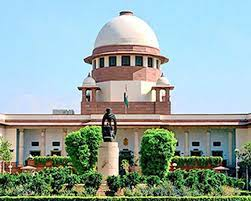On Day 10 of hearing, Solicitor General Tushar Mehta said ---
"The Federation is a Union because it is indestructible. The country is one integral whole. it's people a single people, living under a single imperium..."
(hearing will resume on Monday, Aug 28)
In a blow to 'sickularism' camp, Mehta
also pointed out: "Till 5th August 2019, Jammu and Kashmir Constitution was not having either the term 'Socialist' or 'Secular".
"I will show the devastating effect it would have if this constitution, which according to me is nothing more than a legislature, would not have been repealed the way we have done."
CJI D Y Chandrachud told Solicitor General Tushar Mehta, "Mr SG, to paraphrase your submissions, it can be two fold- 1. The expression of reservations in Instrument of Accession (IoA) not unique to the IoA acceded to by Maharaja Hari Singh?
2. The execution of merger agreement was not a sine qua non to become a part of Union of India.
Solicitor General agrees.
During the hearing, SG Mehta says, "The Constituent assembly of J&K was not a plenary document and it was nothing more than a legislation. There cannot be two constitutions..."
"The Constituent assembly of J&K was not a plenary document", says Solicitor General Mehta
Importantly during the hearing, Tushar Mehta referred to Jawaharlal Nehru and said he had not accepted 'divine right of kings' during States' accession to India
"All these States which became part of India and signed the instrument of accession had some different wording like taxes will be with the State etc, which changed over time and became one federal unit. These states voluntarily joined in the process of Constitution-making. Just a few weeks before becoming the Vice President of the Interim Government, Jawaharlal Nehru clearly stated that no princely state could prevail militarily against the army of independent India.
Nehru, in his capacity as the Vice President of the Interim Government, which included both present day India and Pakistan, clearly said that independent India would not accept the divine right of kings," SG Mehta argued.
SG Mehta then took the Bench through the list of dates: every princely state were allowed to put their own terms and conditions in the instruments of accession with Article 1.
At one point, CJI said, "This was to give a sense of confidence to these princely states so that they can keep some subjects to themselves or adopt the one with the federal legislature.. the intention was to have the states accede to India//
Please show us if there was a draft of the instrument of accession and who prepared it".
SG Mehta also mantained that "The argument that this (Article) 370 is a privilege which cannot be taken away is wrong... there was many such privileges given to other states also...
CJI countered saying: "They joined by their own volition.... but J&K ducked that rule and acceded by 370.. so you are saying instrument of accession of various princely states have various such reservations and conditions and consistent with section 6 of govt of india act and adopted by section 9 of the Indian independence act...
SG continued, "...many states did not sign instrument of merger".
SG Mehta also told the Bench,
"The drafting committee wanted to make it clear that though India was a federation, the federation was not a result of an agreement by the States to join in a federation. Thus, no state had the right to secede from it.
"The Federation is a Union because it is indestructible. The country is one integral whole it's people a single people, living under a single imperium..."
He also said, Till '76, Article 21 was applicable with a truncated way. Article 19- there was a sub article added as it was applied to J&K- that reasonable restrictions would be those which would be prescribed by the legislature.
Meaning thereby, that the persons against whom citizens invoke Article 19 would decide what would be the reasonable restrictions.
SG Mehta (reading from Constituent Assembly debates but tried to bring a light moment and said,
"Pausing here for a minute so that the debate doesn't get boring. Maulana Hasrat Mohani was an eminent Urdu lyricist of his time.
Most of us have heard his 'Chupke Chupke Raat Dinn Aasoon Bahana...' that is by him.
"The question is very important - why are you discriminating people of one state from other states? Your lordships would be shocked when I show you the discrimination.
We have analysed how provisions were picked, modified, and applied to one State.
So far, the residents of J&K were being deprived of what - I'll show you, till 5th August. Ayyangar said that the discrimination is due to special conditions of Kashmir, that state is not right for this kind of integration.
SG Mehta (reading from Ayyangar's statement): "It is the hope of everyone here that in due course even J&K would become ripe for the same sort of integration as has taken place in case of other states. Cheers."
Mehta then said, "The petitioners are confusing internal sovereignty with autonomy.
External sovereignty, no one can dispute lies with the Union. Internal sovereignty would mean autonomy of federal units. This autonomy is there with every state."







No comments:
Post a Comment